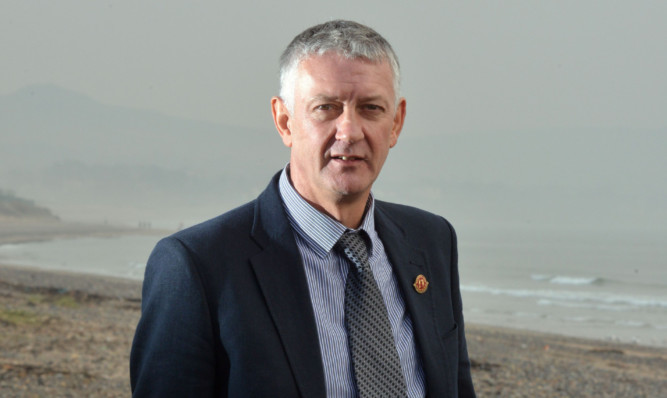Reports of an underground fire near an abandoned Australian coal gasification plant have prompted fresh calls for the process to be banned in Scotland.
Fife councillor Tom Adams, chairman of the central area planning committee, said uncontrolled burning and allegations of environmental harm at the plant in Queensland perfectly illustrated the fears being expressed by Scottish campaigners.
The company preparing plans for the Firth of Forth have issued an assurance that their operation is different from the Australian one and will be closely monitored by health and safety bodies.
However, news that tests had this month found evidence of toxic gases, including carbon monoxide and hydrogen sulphide, at private properties near the Queensland plant has persuaded Mr Adams to declare his stance against the controversial UCG process, which is not included in the Scottish Government’s moratorium on unconventional gas extraction.
This means he may not be able to vote on any planning application relating to UCG which comes before his committee.
Two UCG licences have been granted for the Forth at Kincardine and Largo Bay, sparking fears of an environmental disaster.
Further plans are being developed for the process at the former Frances Colliery in Dysart.
UCG involves drilling a borehole into a coal seam, flushing it with oxygen and igniting it to produce syngas. It has never been attempted offshore, and opponents claim the region is being used as a guinea pig for untested technology.
Mr Adams said: “I think it’s about time it was banned altogether until there has been a decent trial somewhere. I don’t want it here. We’re just not having it.”
He added: “If they are going to do it and they’re serious about it, let them do it in the North Sea, not where it’s close to land.
“In the meantime, we should be calling on our government to talk to the Australian government to see what’s happened there.”
The councillor has previously expressed concern about Fife’s rising mine water amid fears it could break the surface anywhere in the region.
He claimed that if toxic chemicals leaked into the water, Fife could be facing a disaster.
The Linc Energy UCG project in Queensland is now the subject of court action by the state environment department, which alleges the operation caused serious environmental harm.
The company has rejected the charges as “misguided”.
The department is still investigating the cause of the gases found near the surface but said it could not rule out an underground fire.
Farmers in the area have been advised not to excavate or disturb soils more than two metres deep without talking to officials.
‘VERY DIFFICULT TO IMAGINE’ SAME PROBLEMS HERE, SAYS FIRM
Andrew Nunn, chief operating officer of Cluff Natural Resources, said the proposed UCG project in the Firth of Forth is targeting coals 1,000 metres below the surface and this makes it somewhat different to the Australian project, which was gasifying coal at a depth of only 140 metres.
“The 1,000 metres of rock separating the coal from the surface in the Firth of Forth area is the key factor which prevents the unwanted ingress of air into the gasifier and thereby removes the risk of uncontrolled combustion,” he said.
“We obviously cannot comment on alleged HSE failings at the Linc project.
“However, the UK has a very strong and well-regulated health and safety framework which works to protect both employees and the general public from exposure to harmful and toxic chemicals which are widely used in a range of key industries both locally and across the UK.”
He added: “The combination of geological setting and robust regulatory framework existing in the UK makes it very difficult to imagine the alleged issues associated with the Linc Energy project reoccurring in a UK context.”
Mr Nunn pointed out that the Queensland government had released very little information on its preliminary findings, and had admitted the source of gases discovered there was currently unknown.
“It would therefore be unwise to jump to conclusions,” he said.
